
OLD BOYFRIENDS (Joan Tewkesbury, 1979) [07/30/19, Kanopy]
The casual, improvisatory spirit of Tewkesbury’s directorial style (obviously influenced by her collaborations with Robert Altman) often feels directly at odds with the over-determined screenplay provided by Paul Schrader and his brother Leonard. I would have preferred much more of the former than the latter–one can sense Tewkesbury straining to cut her characters loose and abandon themselves to the ambiguities and unsettling absurdities of the contrived plot. Talia Shire is appropriately brittle but ultimately limited, unable to really convey the underlying emotional turmoil that would motivate a woman to seek out a string of disappointing paramours from her past; there is a certain disquieting quality to her blankness, however. Everyone else gives small but incredibly vivid performances: Keith Carradine is surprisingly affecting, and John Houseman’s slow revelation of his bitter contempt makes the hair on the neck stand on edge. It’s always an awful situation trying to grade a film on what it could have been rather than what it actually is, but it seems clear a superior film would have resulted if the director had been given more creative control over her project. When another opportunity never came she decamped to television and never looked back. Our loss.
SCOTTY & THE SECRET HISTORY OF HOLLYWOOD (Matt Tyrnauer, 2017) [07/20/19, Kanopy]
Perfunctory and somewhat aesthetically/ethically sloppy treatment of an endlessly compelling subject. I couldn’t help but wish there was a bit less emphasis on the thrill of name dropping and the “big reveal” of sexual secrets and more focus upon the mundane, everyday operations of male/male sex work in the pre-Stonewall era. (Perhaps Bowers’s controversial memoir does a better job of this?)
EDWARD HOPPER (Ron Peck, 1981) [07/16/19, Online download]
An elegantly handled hour-long essay film (though that doesn’t mean Peck demurs from broaching some of the more tangly aspects of Hopper’s personality and legacy). The closeups of details within the paintings themselves are cannily selected and often revelatory, and I appreciated the attention placed upon Hopper’s lifelong fascination with representing light, truly a most cinematic concern. Also wonderful is the connection, made just near the end, between Hopper’s silent scenes and the narrative distillation of Hollywood promotional film stills. In the last third or so biography and commentary mostly drop away, letting the art speak for itself.
EASY RIDER (Dennis Hopper, 1969) [07/15 – 16/19, Criterion Channel]
While acknowledging its importance as a “generational statement” (Hoberman), completely agree with Dennis Grunes‘ assessment that “today, it is a hollow antique” (though wouldn’t go nearly as far as his hyperbolic declaration it is one of the ten or twelve worst films ever made). Part of the problem is undoubtedly me: I find buddy movies numbingly dull, and was deeply bored within the first 15 minutes. There’s also something about this particular approach to social disavowal that seems vaguely distasteful—and rings hollow—during our particular historical moment of 2019. While the direction and editing is famously indebted to the French New Wave, it lacks that movement’s sense of joy in trying to turn the medium inside out. Was waiting the whole time for Karen Black and the spark her presence brings to any film, and she does indeed initiate the its most effective sequence—not just stylistically, but because it finally feels like it has hit upon something wild, primal, and genuinely terrifying.
GIRLFRIENDS (Claudia Weill, 1978) [07/10/19, Criterion Channel]
Genuinely revelatory in its understated way. Melanie Mayron is pitch-perfect as a young aspiring photographer attempting to find herself and a creative niche amid the cruel indifference of breakneck contemporary urban life. Weill has a keen understanding of the casual rhythms of the everyday, and there’s a sense of generosity–toward the characters, and also toward the viewer–that feels extremely special. Perhaps the best film I’ve seen so far this year.
BRUMES D’AUTOMNE (AUTUMN MIST) (Dimitri Kirsanoff, 1929) [07/08/19, YouTube]
The introductory title card announcing “un poème cinégraphique” is apt, as it does indeed function by a logic traditionally associated with poetry. The visual rhyming is extraordinary: raindrops/tears/falling leaves; mist/smoke/rippling water/vision blurred by tears, etc, and there are literal “turns” (via reflection on water, the camera literally spinning). Such linkages are far from novel, but possess incredible visual force nonetheless. And then there are Nadia Sibirskaïa’s wide, otherworldly eyes—truly one of the undersung glories of cinema.

